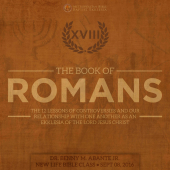Part 18 – The 12 Lessons on Controversies and our Relationship with One Another as an Ekklesia of the Lord Jesus Christ

Lesson Information
Series: The Book of Romans
Lesson: Part 18 – The 12 Lessons on Controversies and our Relationship with One Another as an Ekklesia of the Lord Jesus Christ
Speaker: Dr. Benny M. Abante, Jr.
Text: Romans 14:17-19 (KJV)
Service: New Life Bible Class
Date: September 08, 2016
BOOK OF ROMANS CHAPTER 14
Lesson No. 32 THE 12 LESSONS ON CONTROVERSIES AND OUR RELATIONSHIP WITH ONE ANOTHER AS AN EKKLESIA OF THE LORD JESUS CHRIST
17 For the kingdom of God is not meat and drink; but righteousness, and peace, and joy in the Holy Ghost.
18 For he that in these things serveth Christ is acceptable to God, and approved of men.
19 Let us therefore follow after the things which make for peace, and things wherewith one may edify another. –Romans 14:17-19
How do we really differ as God’s people from the cults and false religions? Where is our faith based from and what does our faith teach us? Romans 14 gives us insights by using examples of some controversies among the early believers. It is best for us now in our day to take heed and learn from them.
MESSAGE
1. The ekklesia is the only place to teach and establish believers in the faith (v.1). Other institutions like home and government are not designed by God to facilitate spiritual growth and maturity. Know where you belong and be faithful to our ekklesia. Everyone even those who are weak in the faith is welcome to the ekklesia family.
2. Our fellowship with one another should not be based on what we eat or not but it must be always according to the will of God (vv. 2-3).
3. We have no right to judge others especially our own brothers and sisters in Christ (v.4). God alone is our Judge. He hates it when we view ourselves as righteous judge of others that we fail to see who we are really before Him.
4. We should be good stewards of time and life (vv.5-6). Our life and time are precious and priceless gifts from God and that we are admonished by the Word of God to never waste and squander them. For what has been lost cannot be returned anymore. Let us be careful and mindful of our time and every opportunity accorded us to serve and witness for Christ.
5. The Lord and His will should always govern our thoughts, feelings and actions (vv. 7-8). We could not care less going about our life without the presence of the Lord and knowing His will in our lives. For we all—
5.1. Live unto the Lord for without Him, we can do nothing (Rom. 12:1-2).
5.2. Die unto the Lord— “I have kept the faith.”
5.3. Are the Lord’s—we all belong to God. We are just waiting for His return.
6. The reason for Christ’s death, burial and resurrection is to declare His lordship (vv.9-11; Phil. 2:9-11).
7. The Lord Jesus as Lord of our lives teaches us that (vv.10-12):
7.1. We shall all face God’s judgment (v.10).
7.2. We are all accountable (v.12).
8. The best judgment: To take heed among ourselves not to be a stumblingblock (v.13). Do not be a hindrance to somebody’s growth and maturity. Or, in which we cause someone to sin.
9. Relationship with believers should always be governed by charity and understanding (vv. 14-15). In the early church, controversies usually come between the Jews and the Gentiles in which the Jews want the Gentiles to live on certain rules determined by their observance of Mosaic laws (1 Cor. 8:11-13).
10. Certain rules are good but when we become judgmental and discriminatory, then these rules become evil. Let therefore righteousness, peace and joy reign among us. For as long as we do certain things to serve the Lord and to give Him honor and glory, then we are acceptable to God and approved of men (vv. 16 -18).
11. Controversies and arguments do not edify the believers (vv. 19-21). There are some Pastors and believers who are always looking for controversies to argue with and malign others. The Lord is telling us to be careful.
12. Our faith in Christ should make us stronger (vv.19-23). It should make us enjoy the blessings of God. It should makes us careful to offend the weak; and the weak to remain weak and offended. Our faith in Christ should teach us the love, patience, joy and righteousness of Christ— “whose we are, and whom we serve.”
—BMA’s Messages, 09.11.16

